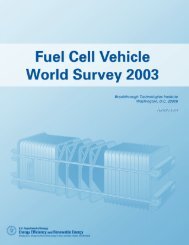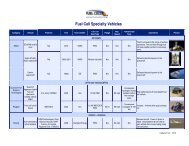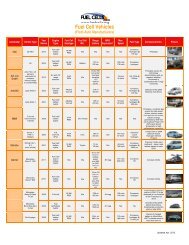Breakthrough Technologies Institute - Fuel Cells 2000
Breakthrough Technologies Institute - Fuel Cells 2000
Breakthrough Technologies Institute - Fuel Cells 2000
You also want an ePaper? Increase the reach of your titles
YUMPU automatically turns print PDFs into web optimized ePapers that Google loves.
The plan must set goals for the years 2012, 2017, and 2022 for increased alternative<br />
fuel use in the state that accomplishes all of the following:<br />
• Optimizes the environmental and public health benefits of alternative fuels,<br />
including, but not limited to, reductions in criteria air pollutants, greenhouse<br />
gases, and water pollutants consistent with existing or future state board<br />
regulations in the most cost-effective manner possible.<br />
• Ensures that there is no net material increase in air pollution, water pollution,<br />
or any other substances that are known to damage human health.<br />
• Minimizes the economic costs to the state, if any.<br />
• Maximizes the economic benefits of producing alternative fuels in the state.<br />
• Considers issues related to consumer acceptance and costs and identifies<br />
methods to overcome any barriers to alternative fuel use.<br />
The plan must also recommend policies to ensure alternative fuel goals are attained,<br />
including, but not limited to:<br />
• Standards on transportation fuels and vehicles.<br />
• Requirements, financial incentives, and other policy mechanisms to ensure<br />
that vehicles capable of operating on alternative fuels use those fuels to the<br />
maximum extent feasible.<br />
• Requirements, financial incentives, and other policy mechanisms to ensure<br />
that alternative fuel fueling stations are available to drivers of AFVs.<br />
• Incentives, requirements, programs, or other mechanisms to encourage the<br />
research, development, demonstration, commercialization, manufacturing, or<br />
production of vehicles that use alternative fuels.<br />
"Alternative fuel" is defined as a nonpetroleum fuel, including electricity, ethanol,<br />
biodiesel, hydrogen, methanol, or natural gas that, when used in vehicles, has<br />
demonstrated, to the satisfaction of the state board, to have the ability to meet applicable<br />
vehicular emission standards.<br />
Contact:<br />
California Energy Commission<br />
<strong>Fuel</strong>s and Transportation Division<br />
Emerging <strong>Fuel</strong>s and Technology Office<br />
1516 Ninth Street, MS-29<br />
Sacramento, CA 95814-5512<br />
Phone: (916) 654-4201<br />
E-mail: rtuvell@energy.state.ca.us<br />
Web: http://energy.ca.gov<br />
Executive Order S-06-06<br />
http://www.governor.ca.gov/state/govsite/gov_htmldisplay.jsp?sCatTitle=Exec+Order&sF<br />
ilePath=/govsite/executive_orders/20060425_S-6-<br />
06.html&sTitle=EXECUTIVE+ORDER+S-06-06&iOID=78063<br />
Executive Order S-06-06 (May 2006) established targets to increase the production and<br />
use of bioenergy, including ethanol and bio-diesel fuels made from renewable resources<br />
21






